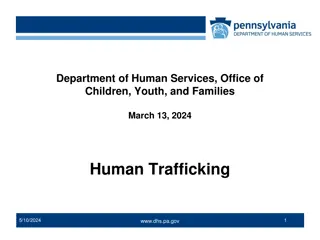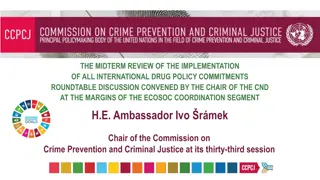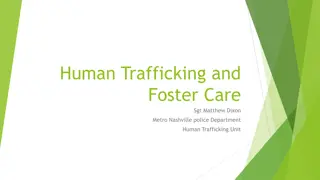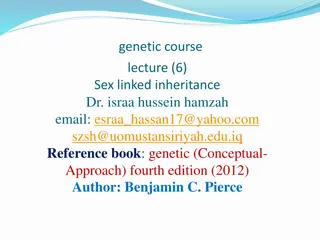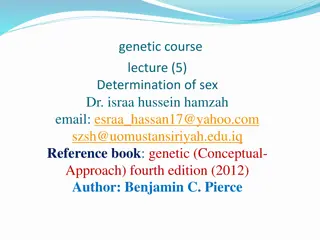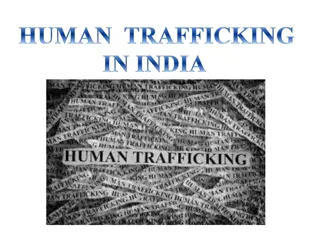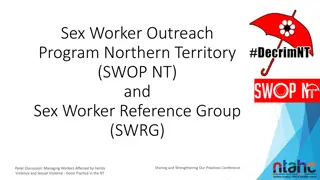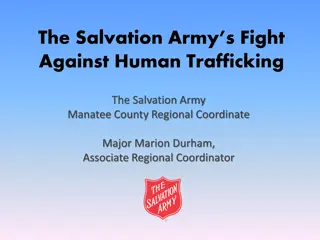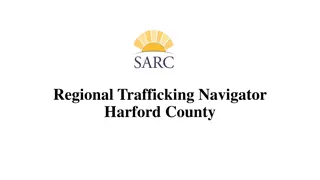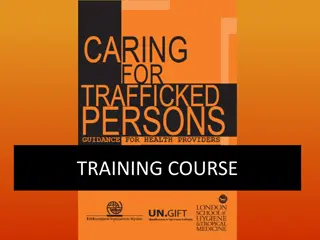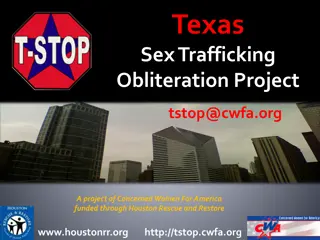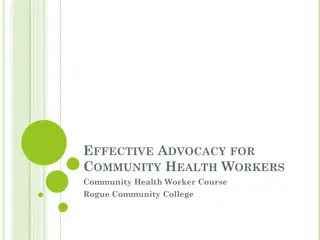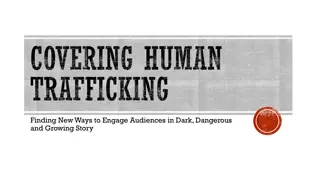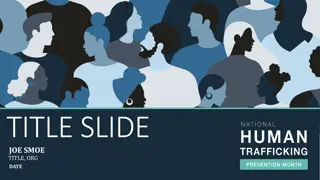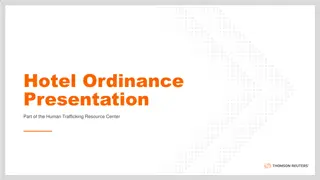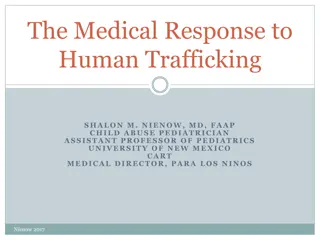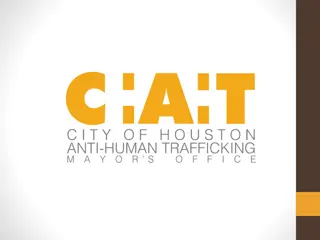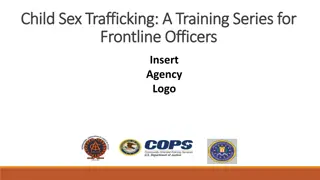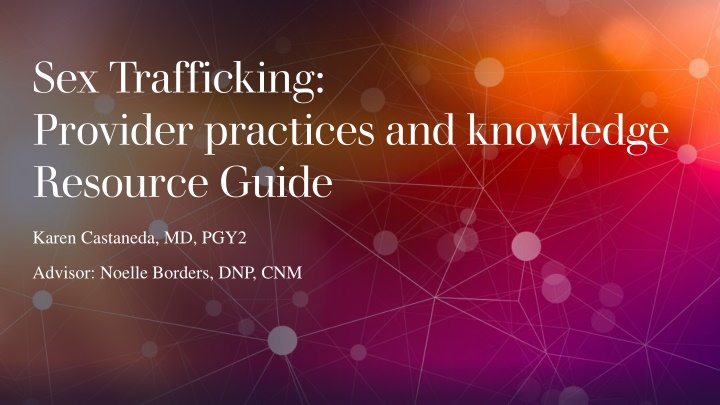
Challenges in Providing Care for Survivors of Sex Trafficking
Explore the barriers faced by healthcare providers in caring for survivors of sex trafficking, learn about the needs of this vulnerable population, and discover how collaboration among diverse professionals can enhance support and improve health outcomes.
Download Presentation

Please find below an Image/Link to download the presentation.
The content on the website is provided AS IS for your information and personal use only. It may not be sold, licensed, or shared on other websites without obtaining consent from the author. If you encounter any issues during the download, it is possible that the publisher has removed the file from their server.
You are allowed to download the files provided on this website for personal or commercial use, subject to the condition that they are used lawfully. All files are the property of their respective owners.
The content on the website is provided AS IS for your information and personal use only. It may not be sold, licensed, or shared on other websites without obtaining consent from the author.
E N D
Presentation Transcript
Sex Trafficking: Provider practices and knowledge Resource Guide Karen Castaneda, MD, PGY2 Advisor: Noelle Borders, DNP, CNM
Background - Survivors of sex trafficking often do not receive the care that they need. - In addition to health services, they often need other services such as food assistance, clothing, housing, child custody, immigration assistance, protective or restraining orders, assistance with any offenses, and prosecution of the aggressor or trafficker. - Healthcare providers can be the first point of contact. Yet, healthcare providers often lack knowledge and personal comfort when caring for survivors of sex trafficking.
Background - Many survivors have been abused for so long and can be greatly affected if providers break their trust. - Therefore, it is important for providers to understand the issues that affect this population, adopt screening tools, and know what resources are available. - Collaboration between multidisciplinary teams such as medical professionals, attorneys, and local organizations can also help address the social needs and improve health outcomes.
Objectives Identify barriers to screening, access to resources, and assessing provider knowledge Create a resource guide for providers and patients
Methods - Survey OBGYN department residents and faculty to identify barriers to screening, evaluate provider knowledge and comfort, and access to resources. N=20 - Gather information from community partners to develop a resource guide
Dont know/unsure: 7/17 (41%) Others: Sex trafficking survival survives through DHS Hotline IPV resources in triage A lot NM State Task Force and Street Safe NM Connect to resources through social worker DOJ & Polaris. Rape Crisis Center of Central NM
Shame in telling someone Transportation* Insurance, language, distance to care* Lack of knowledge Lack of social support Lack of money Unaware of options and resources. Not knowing systems and how to access resources. Not being able to make appointments, fear of repercussions from being in clinic too long, reproductive health coercion (having an abortion), us-versus-them mentality about trusting people including healthcare providers *Most common responses
New Mexico Dream Center Services provided: 2 programs o Spoken for: after care program, any age, housing for adults (18+), emergency housing and transitional, therapy options, case manager, long-term housing (2y vouchers) o Harbor: 12-21, 3 days a week can get meal, clothing, showers, focus is on prevention and detect victims Phone number: (505) 900-3833 Location: 126 General Chennault St. NE Albuquerque, NM 87123 Emergency hotline: 505-504-1301 (e.g. emergency housing) Entry process: Anyone under 21 years old for Harbor qualifies, if older there is screening process. We start by filling out an online screening survey. Then, they meet with a case manager. Eligibility requirements: Screening described above for Spoken For Translation services: Spanish
First Nations Community Healthsource Services provided: vary by location Locations o Truman Clinic First Nations Community HealthSource Truman Clinic Center 625 Truman Street NE, Albuquerque, NM 87110 505-262-2481 Services: medical, substance use, trafficking o Central Clinic First Nations Community HealthSource Central Clinic Center 7317 Central Ave NE, Albuquerque, NM 87110 505-262-2481 Services: for children. If younger than 14, need to be accompanied by a parent/legal guardian. o All Nations Wellness and Healing 6416 Zuni Rd SE, Albuquerque, NM 87108 505-717-2704 Services: Serve breakfast or lunch Phone number: 505-696-0712 Point of Contact: Genevieve Chavez, sex trafficking lead case manager. Phone number 505-267-6059 Translation services: Spanish and translation services for other languages. They also have in person staff that are speakers of Pueblo languages. Eligibility requirements: None, just need to be trafficked. Will screen and ask if someone has forced them to do something they did not want to such as exchange sex for money. There are also no restrictions in the time limit. If they were trafficked 20 yrs ago, they still qualify for services. They serve anyone. Services: Basic case management, medical, dental, and behavior services, can help with Medicaid enrollment, conduct needs assessment and will try to get them to appropriate resources, will help find shelters, facilitate speaking to law enforcement only if they want to
Steelbridge Services provided: This is a faith based one-year long program that assists survivors to help heal trauma and help them transition. They provide counseling, assist in getting a job, and assist w/ housing. Phone number: 505-346-4673 Point of contact: Krystal Rabindranath. Phone number: 505-346-4673 ext. 107 Eligibility requirements: Cannot be on methadone or suboxone. Cannot be pregnant. They need to be able to do the program. They do a lot of walking and physical fitness. Cannot have a lot of obligations. Do not have access to cell phone for first 6 months. Translation services: No
Others Rape Crisis Center of Central New Mexico. New sex trafficking unit. More details to come. Street Safe New Mexico New Mexico s Human Trafficking Hotline 505-GET-FREE 505-483-3733 National trafficking number 1888-373-7888
Next Steps - Continue to update resource guide - Develop screening tool that can be used for patients seen in the UNM healthcare system - Human trafficking training
Conclusions - Literature has reviewed best methods for screening. Yet, most women just want healthcare providers to ask in a sensitive manner and offer options or services. Healthcare providers often lack training/comfort - Most providers surveyed (65%) don t screen routinely. Barriers included not being a routine part of care (45%), lacking confidence (30%), and time constraints (10%).
Conclusions - Developing a screening tool that can be implemented for patients seen in clinic, OB triage and ED is an important next step for identification of survivors. - For the most part, providers were aware of various barriers encountered by survivors of sex trafficking in accessing resources. Responses included lack of trust, shame, fear, lack of insurance, financial constraints. Yet, lack of screening does not allow for identification and appropriate referral for resources. Approx 41% of respondents were not aware of what resources are available. (7/17)

